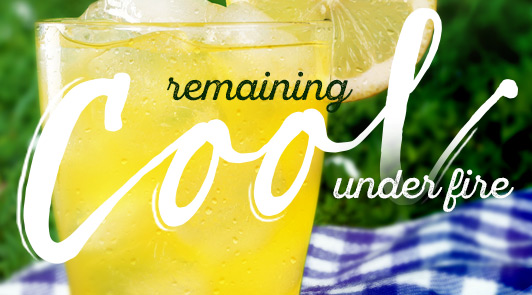Remaining Cool Under Fire
by Dr. David Jeremiah
Most people smile when they see it—a picture of Charlie Brown’s beagle, Snoopy, when he is manifesting his alter ego, “Joe Cool.” There’s just something about a beagle wearing sunglasses, a sweatshirt, a backwards baseball hat, a backpack, tennis shoes—any or all of the above—that makes us laugh. Snoopy lived in a fantasy world. Sometimes he was an author, typing the great American novel on top of his doghouse. And sometimes he was an ace fighter pilot, dueling with the Red Baron, a red scarf and leather helmet his only armaments. And he was also “Joe Cool.”
Whatever roles Snoopy tried to inhabit, he always failed. He got shot down by the Red Baron, his novels never were finished, and his human-kid companions just didn’t buy the “Joe Cool” bit. But give him credit for trying to reinvent himself every so often.
He certainly wasn’t the only one who has ever tried to be cool. The dictionary defines coolness as “the quality of being fashionably attractive or impressive.” That’s what Snoopy was going for, and it’s what a lot of people strive for, too. In our lifetime, “cool” entered the broader cultural conversation in the 1950s with the Beat Generation of hipsters, poets, and artists that populated New York City’s Greenwich Village. Something that was “cool” was, as the dictionary says, attractive and impressive—it could be people, art, fashion, music, or poetry. Eventually, anything could be cool; cool was in the eye of the beholder.
But there is another dimension of coolness. It can also mean composed and controlled as in “cool under fire.” That military metaphor is a good one for life, isn’t it? Sometimes we feel we are being attacked from all directions by circumstances, people, and problems. Often we are! And behind those attacks may well be our spiritual enemy who slings his “fiery darts” at us in various forms (Ephesians 6:16).
Hopefully, we have been rescued from the “Snoopy Syndrome” of having to invent a “Joe Cool” persona for ourselves to impress other people. That’s a fantasy world that has no bearing on our ability to live in the real world. As Solomon taught, “Those who work their land will have abundant food, but those who chase fantasies have no sense” (Proverbs 12:11, NIV).
But the other kind of cool—cool under fire—is the coolness we want to cultivate.
Coolness as a Character
When professional tennis players—those lucky enough to make it to Centre Court at the All England Lawn and Tennis and Croquet Club in the Wimbledon Championships—make their way from the players’ area into the stadium, they pass these words written on the wall: “If you can meet with Triumph and Disaster and treat those two impostors just the same . . . .” Players don’t know what awaits them on Centre Court—triumph or disaster. But it is as if the author of those words, the poet Rudyard Kipling, is reminding the players to keep their cool on the court.
Kipling’s poem, “If,” is one of history’s most famous—its first two lines being known to generations of school children: “If you can keep your head when all about you are losing theirs and blaming it on you.” In thirty lines Kipling offers up a score of thoughtful hypotheticals that lie as traps for the character of all men. If we succeed in keeping our cool in all those situations, Kipling offers a reward: “Yours is the Earth and everything that’s in it, and—which is more—you’ll be a Man, my son.”
That’s not a completely biblical sentiment (although Jesus did say the meek will inherit the earth—Matthew 5:5), but you get the point. Coolness under fire, under testing and temptation, is a sign of character. Jesus was, of course, the epitome of cool under fire and the epitome of godly character. So there is a cool-character connection we need to explore.
Cool Characters
Jesus wasn’t the only biblical character to remain cool under fire; there were many others depending on how we define “cool.” Moses stayed cool when confronting Pharaoh but lost his cool when trying to produce water for the Israelites in the wilderness. David kept his cool when Saul tried to murder him, but lost it when he was tempted by the appearance of Bathsheba. Peter kept his cool as a disciple of Jesus until he lost it and lied about his relationship with the Master. Even Paul could be accused of losing his cool when he severely rebuked Peter in front of the church in Syrian Antioch.
We identify with these characters because they are real, not perfect. Their hearts were all about serving God and regaining their cool when they lost it. And there are plenty of other characters who lived commendable lives under pressure: Joshua, Gideon, Ruth, the prophets, Daniel and his friends, Ezra, Nehemiah, Mary and Joseph, the disciples (except Judas), Priscilla and Aquila, and more. Even if they did ever lose their cool in situations not recorded in Scripture, for the most part they were cool under fire.
But perfection isn’t the point; growth in grace is. We learn from Scripture that God can use ordinary people in very stressful situations and environments and empower them to stay “cool under fire.” We want to join the list of those characters. The same God who kept them cool can keep us cool, too.
That raises the question: What is the benefit of keeping our cool? What cause are we advancing by remaining composed and controlled when the pressure is on? The answer to that question has two parts.
Cool Causes
The first part is internal: We testify to ourselves that God is changing us into the image of Christ. Think of how you responded to stress, trials, and trouble before you met Christ; then think of how you respond to those same things today. Is there a difference? Are you “cooler” now than you were then? If so, it’s because the grace of God has been at work in your life. You are changing more and more into the image of Jesus Christ—just like Romans 8:28-29 says. God uses troubles to conform us to the image of the “coolest” person who ever lived. We testify to ourselves that we are learning to trust God in every situation.
But the second part is external: We testify to others about the power of God that can change their lives, too.
A three-stage chain of influence is described in Acts 4 that shows the power of a cool life. After Christ’s ascension into heaven the apostles were preaching the Gospel in Jerusalem with great influence. Peter and John were arrested and put in jail. In this scenario of events there were several levels of influence.
- Jesus’ influence on the apostles. The Jewish leaders realized that ordinary, unschooled men (the disciples of Jesus) had been transformed by Jesus as a result of His influence on them (Acts 4:13). Just by being around Jesus and watching the power of God in His life, their lives were changed.
- Jesus’ and the apostles’ influence on the Jewish leaders. We already know that Jesus had greatly influenced one of the leaders, Nicodemus, who became a follower (John 3:1-9; 7:50-53). And the Jewish leaders were mightily impressed by Peter and John’s coolness under fire. Did any of them believe? We don’t know. But Peter and John’s testimonies certainly got their attention (Acts 4:16).
- The apostles’ influence on the people of Jerusalem. Thousands had believed already (Acts 2:41). But when Peter and John were arrested after they healed a lame man in the temple gate, the city was consumed with the apostles’ boldness (Acts 4:16-17). Not even being punished caused the apostles to lose their cool—and the people were impressed.
Jesus’ testimony influenced the disciples and they became apostles. The apostles influenced the Jewish leaders and the people of Jerusalem. And on and on for the last twenty centuries.
Why is remaining “cool under fire” so impressive? Because it’s so rare! It’s not normal or natural, so when it happens people are taken aback. They want to know how it is possible to “keep your head when all about you are losing theirs”—sometimes literally as many Christian martyrs have demonstrated. Your trust in God influences others to trust in God.
Bottom line: being “cool” is Christian. It’s what is expected. Cool Christians make Christianity seem cool to others. And that is definitely a cool thing.












 Turning Point for God is a tax-exempt, not-for-profit, religious corporation as defined under Section 501(c)(3) of the Internal Revenue Code. Your donation gift(s) are very much appreciated and may qualify as a charitable deduction for federal income tax purposes.
Turning Point for God is a tax-exempt, not-for-profit, religious corporation as defined under Section 501(c)(3) of the Internal Revenue Code. Your donation gift(s) are very much appreciated and may qualify as a charitable deduction for federal income tax purposes.




